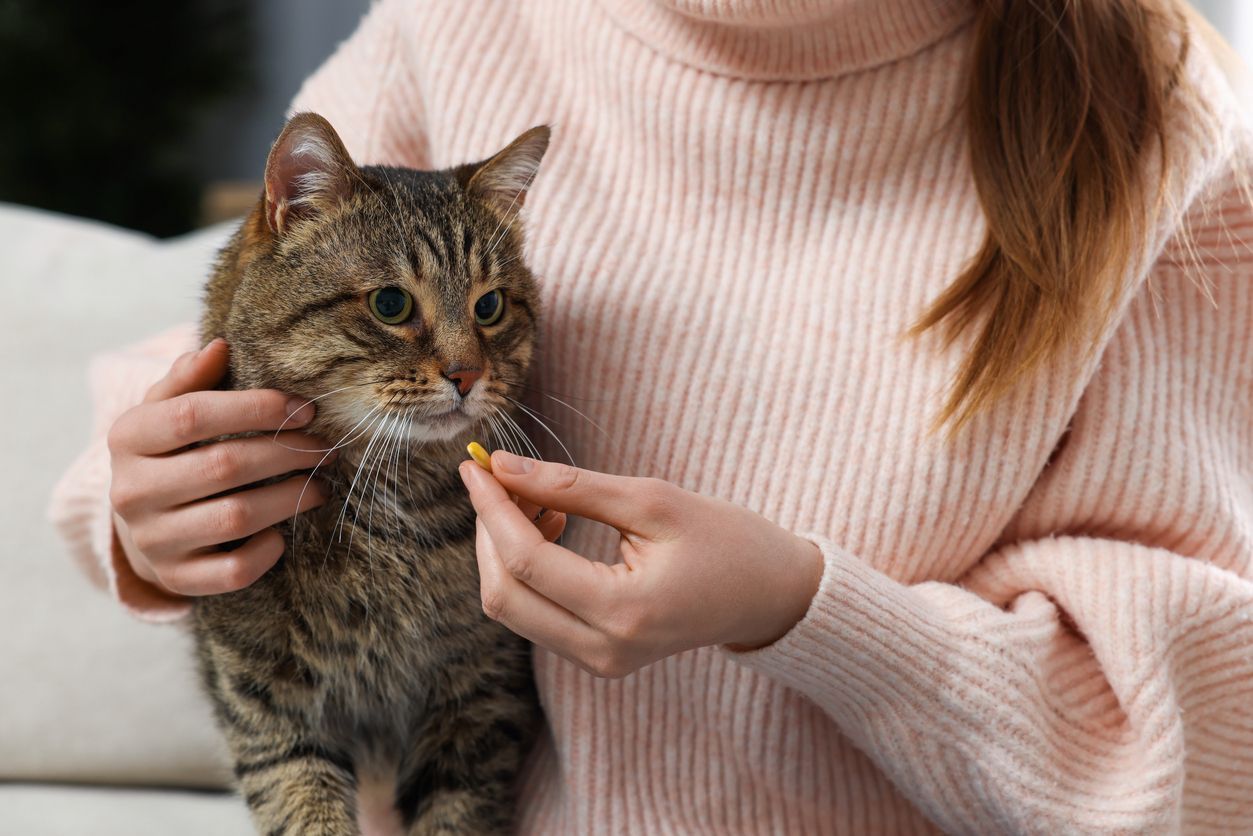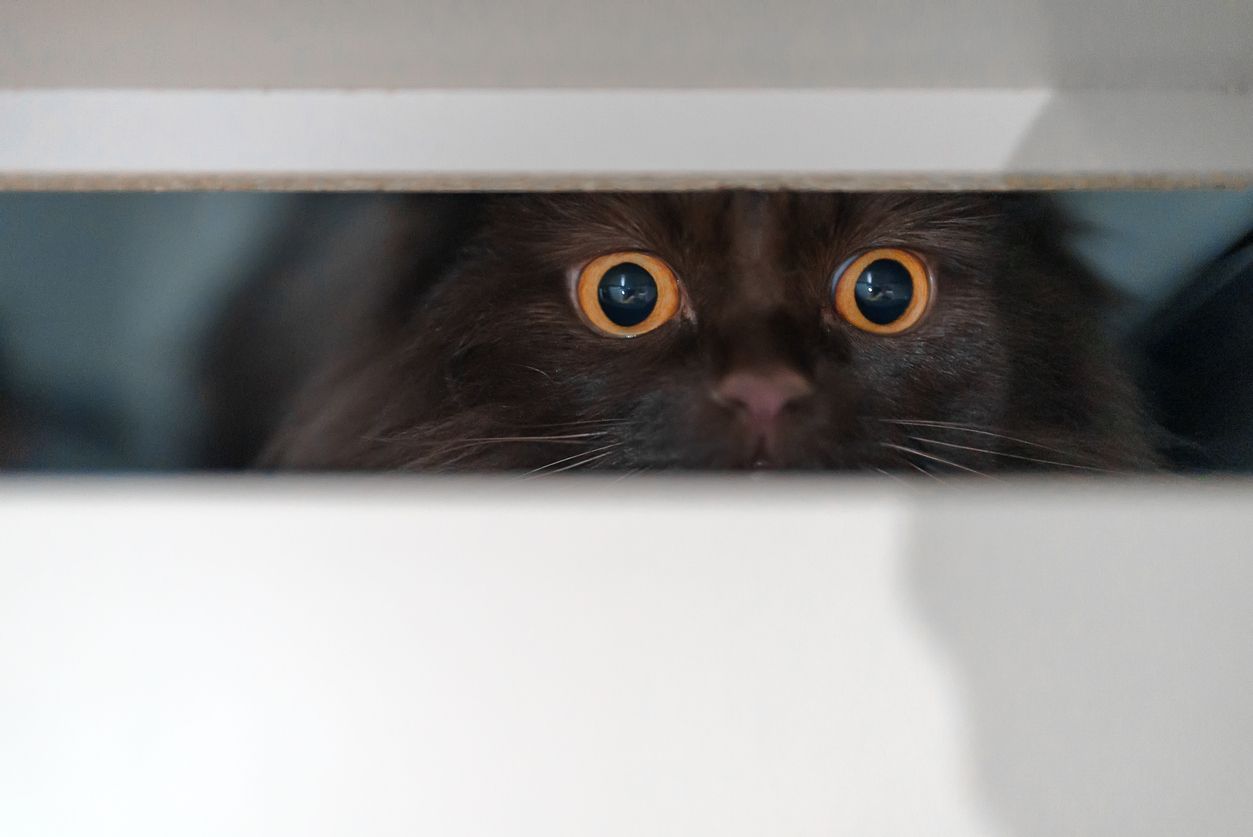Can my cat’s medication cause an upset stomach?

It’s never fun when our cats feel unwell, and seeing gastrointestinal side effects of medication that is supposed to make them feel better can be frustrating. Read on if you have ever wondered:
- Why do gastrointestinal side effects occur?
- What medications can cause an upset stomach in my cat?
- Can side effects from my cat’s medication be prevented?
- How can I help my cat if they have side effects from their medication?
Medication side effects do occasionally occur in cats. Severe side effects in cats are rare. In most cases, signs of stomach upset associated with medications are usually mild and resolve on their own. Closely following the instructions on the medication according to the attending veterinarian’s advice is the best way to ensure the medication works as intended, without any unforeseen side effects.
Why do some medications cause stomach upset in cats?
Most cats taking medications don’t experience any side effects, but every cat is unique and may have different sensitivities to certain medications. Some medications can irritate the stomach and intestines, which can lead to nausea and vomiting. Other medications can alter healthy gut flora, resulting in side effects such as vomiting and diarrhea.
It’s easy for pet parents to confuse normal feline behaviors with side effects. Some medications simply taste bad and may result in a cat foaming at the mouth or spitting out the medication. In addition, cats are notorious for making administration of oral medications difficult for everyone involved. A dust-up with your furry friend might result in them gagging on the medicine.
What are the clinical signs of stomach upset in cats?
Stomach upset is a broad term covering a variety of symptoms including vomiting, diarrhea, and lack of appetite. These symptoms may be a side effect of medication or due to another health condition the cat is experiencing. Less common side effects depend on what medication is in use and may include constipation, excessive salivation, acid reflux, or regurgitation. Side effects from medication are generally mild and temporary in cats.
It’s important to remember feline GI symptoms are caused by various conditions and situations. It’s always possible that a cat’s GI upset is unrelated to their medication. If a cat loses its appetite, begins vomiting, or has diarrhea while on medication, it’s best to talk with a veterinarian before jumping to conclusions or making any changes to your cat’s medication protocols.
Which medications are associated with GI side effects in cats?
All medications have potential side effects, but fortunately most are uncommon in cats. Many pet parents turn to package inserts to learn more about medications before using them for their pets. Reading the package insert is a great place to start, but this information can be difficult to understand without additional medical context. It’s important to ask a vet about possible side effects every time your cat starts a new medication and what to keep an eye out for while your pet is on the medication. Some common feline medications associated with GI side effects include:
Antibiotics
Antibiotics are used to fight bacteria when your cat has an infection. Unfortunately, many antibiotics also kill beneficial bacteria within the digestive tract that promote gut health and digestion. As a result, vomiting and diarrhea can occur. Examples of common antibiotics used in cats that may cause an upset stomach are:
- Amoxicillin
- Metronidazole
Metronidazole is frequently used to treat giardia, bacterial infections, and other types of infections associated with diarrhea. The medication has a very bitter taste so cats often froth at the mouth if they taste it during administration. Frothing at the mouth immediately after attempting to take medication is not a side effect; it is a physical reaction to the unpleasant flavor of the pill that resolves on its own. If your cat is struggling to take medications, consider asking your vet for a different formulation- such as a liquid for oral dosing- that might be easier for you to dispense to your furry friend.
Anti-inflammatories and pain control medications
Drugs used for inflammation and pain control may irritate the stomach lining, resulting in stomach upset. Medications in this category include:
- Prednisone
- Robenacoxib (Onsior®)
- Frunevetmab (Solensia™)
- Cyclosporine
- Meloxicam (Metacam®)
- Buprenorphine
Cats are particularly sensitive to anti-inflammatories. Many drugs used to control pain and inflammation that are safe for use in other animals are toxic to cats. Working closely with a veterinarian is important when managing a cat’s pain and inflammation. Never give a cat pain medication or an anti-inflammatory medication not intended for them. Human medications such as ibuprofen and acetaminophen are highly toxic to cats.
Parasite prevention and dewormers
Regardless of their lifestyle, all cats should be on year-round parasite prevention. Oral administration of prevention medications can sometimes cause GI upset as a side effect. Conversely, topical solutions rarely cause GI symptoms but are more likely to cause mild skin irritation.
Dewormers work by killing intestinal parasites, if there are any present. As this occurs, the infected cat either digests the dead worms or passes them directly in the stool. This process can cause mild GI symptoms such as diarrhea.
Anesthesia and chemotherapy
Chemotherapy drugs and cancer treatment are used differently in cats than in humans. Rather than the aggressive methods used in people that cause severe side effects, animal chemo is intended to relieve cancer symptoms and offer more quality time with their owners instead of a cure. As a result, animals tolerate chemo fairly well and often have few to no side effects.
Temporary nausea and vomiting are common in cats immediately after anesthesia or during chemotherapy treatment. These symptoms are usually short-lived and do not last after the anesthesia or chemo wears off.
Can I prevent gastrointestinal side effects from my cat’s medication?
Predicting if a cat will have side effects from a new medication can be difficult, and side effects cannot always be prevented.

“Always read and follow the label instructions for every medication you give your cat,” Dr. Jo Myers, a Vetster veterinarian, explains. “When in doubt, always talk to a vet.” Some medications are supposed to be given with food to help prevent stomach irritation, while others must be given on an empty stomach. Other medications cannot be given simultaneously and may be ineffective or interact adversely when given together. Make sure your veterinarian is aware of all other drugs and supplements your cat is taking whenever a new medication is prescribed. Finally, always give medications in the proper dosage and store them correctly according to the label and prescribing veterinarian’s instructions.
How do veterinarians treat a cat’s upset stomach caused by medications?
Sometimes, a vet may change the drug or offer another medication if a side effect occurs. When stomach upset occurs, it is usually mild and temporary. Medications and dosages are chosen for your cat based on their individual needs and to minimize the likelihood of side effects. Always follow veterinary instructions when giving a cat medication and ask how to prevent an upset stomach.
What should I do if my cat has side effects from their medication?
Consult with a vet if you are concerned that your cat is not responding well to medication. It can be difficult to know if GI symptoms are the result of the medication or if they are caused by something else. Cats are especially sensitive to anti-inflammatory drugs, and a vet must be contacted immediately if GI symptoms occur when taking these medications.
Before giving a new medication, discuss the potential side effects with a vet and how to help if they occur. Never give additional medications without veterinary approval, as they can cause dangerous drug interactions or cause one or both medications to be ineffective. Finally, do not stop the medication without a vet’s instruction.
If you are confused about how to give your cat their medication, their proper dosage, or how to store the medication safely, an online vet can quickly give expert advice. They can also explain what to look out for if you are concerned about side effects.
FAQ - Can my cat’s medication cause an upset stomach?
Can medications cause stomach upset in cats?
Medications such as antibiotics, drugs for pain or inflammation, anesthesia, and chemotherapy drugs can cause stomach upset as a side effect in cats. Luckily, side effects from medications are uncommon and usually mild and short-lived. Side effects are not the same as an allergic reaction to a medication. Contact a vet if your cat begins to experience GI symptoms after starting a new medication.
How do you treat an inflamed stomach in a cat?
A wide variety of conditions can cause gastritis. The treatment for stomach inflammation varies based on the individual cat’s condition and medical history.
Why does my cat vomit after getting their medication?
Nausea and vomiting are potential side effects of many medications, including antibiotics and those used for pain control. When administering the medication, vomiting can also occur in cats if they gag on the medication or if the drug tastes particularly bad.
Can medicines cause diarrhea in cats?
Medicines that can affect healthy gut flora, such as antibiotics, can result in diarrhea. Diarrhea caused by medications is usually mild and short-lived. Contact a vet if your cat starts having diarrhea shortly after taking a new medication.




